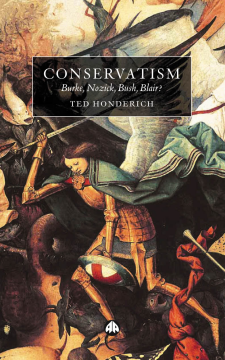
Additional Information
Book Details
Abstract
This is a new edition of a classic work by one of the world's leading progressive political philosophers. Ted Honderich examines ideology and reality in British and American politics
in order to establish the true distinctions of conservatism.
Conservatives often claim to believe in reform, but not change, to rely on instinct rather than abstract theories. So what is the conservative rationale? Does conservatism have a philosophical founding principle that unifies it?
Ted Honderich’s search for the fundamental principle of conservatism is an enlightening one. He examines influential thinkers in the conservative tradition, from Edmund Burke and Adam Smith to Michael Oakeshott and Robert Nozick. He brings rigorous analytic philosophy to bear on the Republican party in the United States, and the Conservative party and the New Labour party in Britain.
'The whole book must be read. Indeed only the final page, like a good detective story, brings with it the full philosophical discovery'
Michael Foot, Observer
'Ted Honderich's self-righteousness may not reach to the height of a Robespierre or a Lenin; but it is for all that alarming. Given his failure of imagination concerning every experience and opinion that he does not share, one must hope that he remains confined to a university chair'
Roger Scruton, Philosophical Quarterly
'A tumultuous onslaught ... a substantial piece of work'
Anthony Quinton, The Times
'My schematic outline doesn't begin to convey the passion that informs the analyses in Conservatism, nor does it suggest the wealth of arguments it contains. Well argued or badly argued, Conservatism is relentlessly, fiercely argued.'
Robert Fullinwider, Philosophical Books
'[A] powerful critique of the major beliefs of modern conservatism ... [Honderich] shows how much a rigourous philosopher can contribute to understanding the fashionable but deeply ruinous absurdities of his times.'
Bhiku Parekh, New Statesman
'[An] extended analysis of conservative political theory by an eminent radical philosopher ... a significant and timely event'
Noel O'Sullivan, Utilitas
Table of Contents
| Section Title | Page | Action | Price |
|---|---|---|---|
| Contents | vii | ||
| Introduction | 1 | ||
| 1. Change and Reform | 6 | ||
| A TRADITION AGAINST CHANGE? | 6 | ||
| REFORM, NOT CHANGE – BURKE | 10 | ||
| OAKESHOTT’S AND OTHER IDEAS | 15 | ||
| DISTINCTIONS AND RATIONALE | 22 | ||
| NEW LABOUR | 24 | ||
| 2. Theory, Other Thinking, | 32 | ||
| BAD THINKING | 32 | ||
| GOOD THINKING | 36 | ||
| TIME-TESTED NOT THEORETICAL | 41 | ||
| DIFFERENT TESTS OF TIME | 46 | ||
| EMPIRICAL NOT THEORETICAL, A PLAIN FACT | 51 | ||
| VALUES AND RATIONALE | 56 | ||
| NEW GOVERNMENT | 61 | ||
| 3. Human Nature, Dealing With It | 69 | ||
| A BUNDLE OF IDEAS ABOUT US | 69 | ||
| CREATURES OF SOCIETY, AND A CONCEPTION | 79 | ||
| A PLAIN IDEA | 83 | ||
| LOW CHARACTERS, AND ORDER IN SOCIETY | 87 | ||
| LOW CHARACTERS, AND INCENTIVES AGAIN | 94 | ||
| NOT DETERMINISM, BUT FREE WILL | 100 | ||
| NEW MORAL AND OTHER PURPOSES | 106 | ||
| 4. Freedoms | 113 | ||
| PRIVATE-PROPERTY FREEDOM | 113 | ||
| CONSERVATIVE PRIVATE-PROPERTY FREEDOM | 119 | ||
| MARKET FREEDOM, ETC. | 125 | ||
| DECLARATION, EQUALITY, INCENTIVE | 129 | ||
| THE HIDDEN-HAND VINDICATION | 134 | ||
| NON-ECONOMIC ARGUMENTS | 139 | ||
| MIXING LABOUR, TRANSFERRING | 147 | ||
| SOCIAL AND CIVIL FREEDOMS | 151 | ||
| HOPE, NEW REALISMS | 156 | ||
| 5. Government | 162 | ||
| DEMOCRACY | 162 | ||
| PROPERTY, ARISTOCRACY, BALANCE | 169 | ||
| CONSTITUTIONALISM, REVOLUTION, INTERNATIONAL | 174 | ||
| AUTHORITARIANISM, FASCISM | 180 | ||
| RATIONALE, BACKWARD GLANCE | 184 | ||
| NEW AND OLD DEMOCRACY, 9/11 | 187 | ||
| 6. Society | 192 | ||
| THE ORGANIC SOCIETY | 192 | ||
| A THING, A WHOLE, PERSONAL | 196 | ||
| A TREE, INHERITANCE, GOD, A LARGE FRIEND | 200 | ||
| RACIAL AND CULTURAL GROUPS | 204 | ||
| NOT SO NEW LABOUR | 213 | ||
| 7. Equalities | 219 | ||
| A MIXED BAG OF EQUALITIES | 219 | ||
| EQUALITY OF RESULTS | 231 | ||
| ASSORTED OBJECTIONS TO EQUALITY OF RESULTS | 233 | ||
| LIBERTY OBJECTIONS TO EQUALITY OF RESULTS | 239 | ||
| THE GENERAL GOOD OF INEQUALITIES AGAIN | 246 | ||
| THE MERE RELATIVITIES OR IRRATIONALITY OBJECTION | 255 | ||
| NEW LABOUR’S AMERICAN WAR | 259 | ||
| 8. Desert, Conclusions | 270 | ||
| THE DISTINCTIONS AND THEIR PROBLEM | 270 | ||
| DESERT THE RATIONALE? | 277 | ||
| OBSTACLES TO THE IDEA OF DESERT | 283 | ||
| THE PRINCIPLE OF HUMANITY | 294 | ||
| THE RATIONALE OF CONSERVATISM | 301 | ||
| THE NATURE OF NEW LABOUR | 303 | ||
| Acknowledgements | 313 | ||
| Notes | 314 | ||
| Index | 329 |
